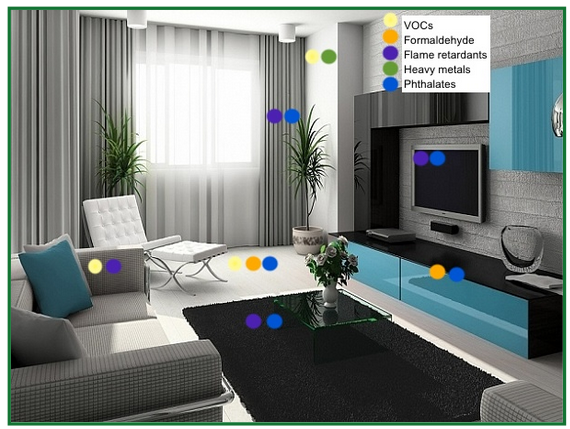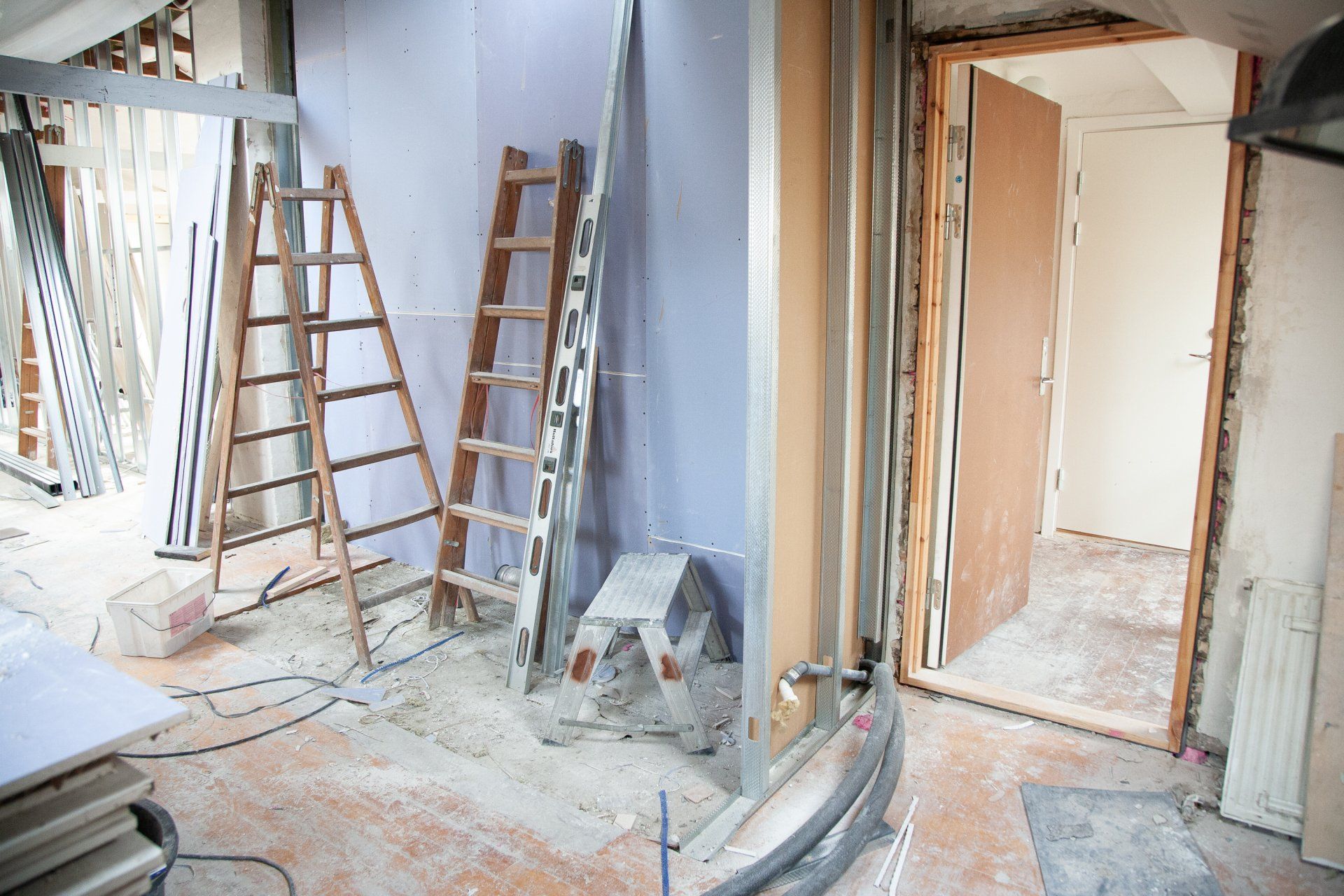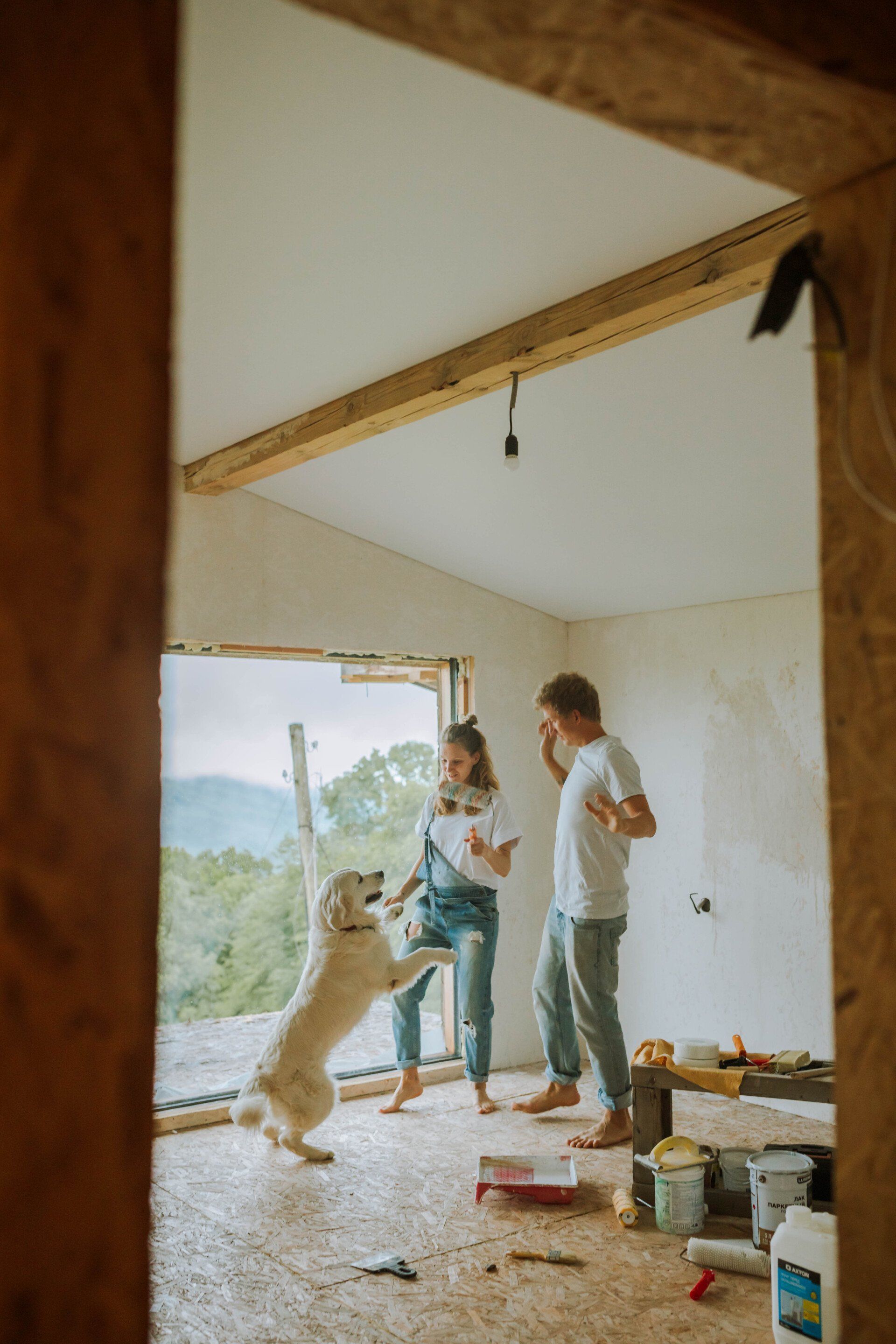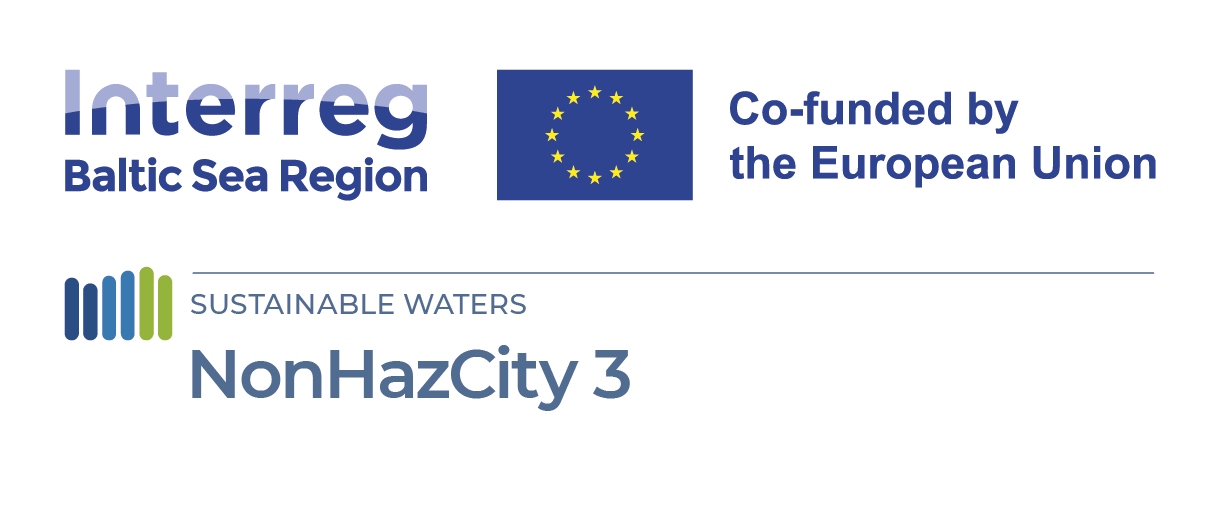NonHazCity3 campaign
2023-2025
We have launched a campaign in the Baltic Sea region to raise public awareness about ways to address chemicals safety issues in buildings, construction, and households!
OVERVIEW OF THE CAMPAIGN
The raising awareness campaign has been launched in December 2023 under the "NonHazCity3" project, which aims at reducing hazardous substances in construction to safeguard the aquatic environment, protect human health and achieve more sustainable buildings.
The #NHC3Campaign will last until the end of the project in 2025 and will provide relevant information on the topic and the results of the project itself.
Throughout the campaign, we will show the
chemicals in construction materials, and why there is currently so much
concern about it. We will explore the crucial interlink between climate-neutrality, circularity and toxicity of building materials & buildings and will try to put this issue on the Baltic Sea Regional agenda
And, of course, you will read
stories of change coming from various municipalities, businesses, and organizations around the Baltic Sea who work towards Baltic countries free from toxic chemicals in construction!
Everyone will be able to shape the content of the campaign, so follow us and interact!
You can find all the extra resources below.
#NonHazCity3Campaign - Follow us!
Are you eager to learn more about ways to address chemicals safety issues in buildings, construction, and households?
Follow follow us on social media through the hashtag: #NHC3Campaign
Topics of the #NHC3Campaign
Dive into the different topics, advices and solutions. Spread the word and be part of the change!
Do you want to suggest a topic or have any doubts or questions?
Write to us: secretariat (at) ccb.se
CONSTRUCTION MATERIALS & ENVIRONMENT
Go to the extra resourcesCONSTRUCTION MATERIALS & HEALTH
Go to extra resourcesCHEMICALS POLICY
Coming soonCONSTRUCTION MATERIALS & ENVIRONMENT
Renovating or building a home is a challenge. Thinking through functional design, choosing beautiful finishes and monitoring the quality of workmanship and budget is no easy task. And whether you are renovating one room or building a whole house, there are many parameters to consider. But there is one important detail that we rarely think about: the construction and renovation sector has a significant impact on the environment. Let's take a closer look at why we should care about the environment when we build or renovate our homes.
EXTRA RESOURCES
Reports & Researches:
- The construction sector’s sinking circular foundations 2023/26/05: https://think.ing.com/articles/sinking-circular-foundations-in-construction-industry
- Mineral waste from construction and demolition, waste treatment 2020/01/16: https://www.eea.europa.eu/data-and-maps/daviz/mineral-waste-from-construction-and#tab-googlechartid_chart_13
- The Global Status Report for Buildings and Construction: https://globalabc.org/our-work/tracking-progress-global-status-report
- The impact of renovation measures on building environmental performance: An emergy approach
https://www.sciencedirect.com/science/article/abs/pii/S0959652617312246
CONSTRUCTION MATERIALS & HEALTH
HOME RENOVATION
Renovating even a small room is a complex project that requires planning. And renovating with chemical safety in mind is a more complex project. However, if you plan and prepare properly in advance, the process will go much easier. Let's take a look at the important nuances of preparing for a renovation to make it as safe as possible for your family's health and the environment.
Let's get to know the chemicals that can harm our health during the renovation process.

EXTRA RESOURCES
- https://www.epa.gov/indoor-air-quality-iaq/what-are-volatile-organic-compounds-vocs#:~:text=Volatile%20organic%20compounds%20(VOCs)%20are,long%2Dterm%20adverse%20health%20effects
- https://www.ncbi.nlm.nih.gov/pmc/articles/PMC7914726/
- https://www.epa.gov/indoor-air-quality-iaq/volatile-organic-compounds-impact-indoor-air-quality
- https://pubmed.ncbi.nlm.nih.gov/35622720/
- https://www.epa.gov/formaldehyde/facts-about-formaldehyde#:~:text=affect%20human%20health.-,Health%20Effects%20of%20Formaldehyde,health%20effects%20of%20formaldehyde%20exposure
- https://www.cancer.gov/about-cancer/causes-prevention/risk/substances/formaldehyde/formaldehyde-fact-sheet
- https://www.unep.org/topics/chemicals-and-pollution-action/pollution-and-health/persistent-organic-pollutants-pops/flame#:~:text=Flame%20Retardants%20are%20any%20chemicals,prevent%20the%20spread%20of%20fire
- https://www.niehs.nih.gov/health/topics/agents/flame_retardants
- https://www.cdc.gov/nceh/lead/prevention/health-effects.htm
- https://www.cdc.gov/nceh/lead/prevention/pregnant.htm
- https://www.epa.gov/lead/lead-safe-renovations-diyers
- https://www.ncbi.nlm.nih.gov/pmc/articles/PMC8473253/
- https://www.no-burn.org/wp-content/uploads/FINAL-Testing-Carpet-for-Toxics.pdf
- https://toxicfreefuture.org/toxic-chemicals/phthalates/
INDOOR RENOVATION: PARTITION WALL CONSTRUCTION
Sometimes when renovating a room, it is necessary to change the planning of the room or floor: for example, to separate the sleeping area from the main part, or to hide communications and pipes. The most popular solution in this case will be the use of so-called "dry construction". Dry construction involves the use of materials such as panels or boards, metal studs and screws, rather than traditional wet construction methods such as plastering or masonry. This method has grown in popularity because it has plenty of advantages: it is cost-effective, has quick installation, good performance in insulation and acoustics, installation process is clean and with minimal waste generation. The most important task at this stage of the renovation is to choose healthy and sustainable materials to be used for the partitions.
Here's a look at the main ones.
EXTRA RESOURCES
- https://informed.habitablefuture.org/resources/news/88-selecting-the-wrong-drywall-could-introduce-mercury-into-the-environment
- https://www.cdc.gov/niosh/docs/2013-102/pdfs/2013-102.pdf?id=10.26616/NIOSHPUB2013102
- https://habitablefuture.org/wp-content/uploads/2024/03/83-Antimicrobial_WhitePaper_PerkinsWill.pdf
- https://gypsum.org/recycling-gypsum-wallboard/
- https://www.ncbi.nlm.nih.gov/pmc/articles/PMC7914726/
- https://fsc.org/en
- https://www.pefc.org/
- https://informed.habitablefuture.org/product-guidance/6-doors
- https://www.ul.com/services/ul-greenguard-certification
INDOOR RENOVATION: PAINTS
Health Risks: Using interior paints during renovations can cause health problems such as respiratory issues, skin and eye irritation, headaches, and long-term neurological or reproductive harm. These effects are mainly due to VOCs and other critical compounds, like phthalates and nonylphenol ethoxylates,that may be present in the paint. Prolonged exposure can lead to serious health effects, including organ damage or cancer. Another concern is heavy metals. While most hazardous heavy metals, such as lead and cadmium, are now banned from paints, they may still be present in older layers from previous renovations. Therefore, it's essential to follow safety precautions when removing old paint, including using PPE, HEPA filters, or professional services.
Environmental Impact:
Paints contribute to air pollution and smog formation due to the VOC content. If disposed of improperly, residues of many paints can contaminate groundwater. Since most paints are synthetic and not biodegradable or recyclable, they add to waste generation.
Renovating even a small room is a complex project that requires planning. And renovating with chemical safety in mind is a more complex project. However, if you plan and prepare properly in advance, the process will go much easier. Let's take a look at the important nuances of preparing for a renovation to make it as safe as possible for your family's health and the environment.
Key Components of Paint
Most paints are composed of multiple components, including the following:
- Binder: Holds the composition together and binds them to the surface.
- Pigments: Provide the paint’s color.
- Solvent: keeps the composition liquid - dissolved and suspended. Makes the paint easier to apply and aids in drying.
Solvents can be of two types:
- Oil-based: Derived from petroleum, these contain higher levels of VOCs. In some countries, oil-based paints are only allowed for outdoor use by professionals .
- Water-based: These paints use water as the main solvent but become waterproof as they dry due to added substances. Interior paints are typically water-based.
Types of Paint Binders:
Interior paints are most commonly classified by the type of binder, which determines their function and performance. The most common types are:
- Lime: Also known as limewash, this is an eco-friendly paint made from crushed, burned limestone mixed with water to create slaked lime (calcium hydroxide).
- Mineral silicate: Made from inorganic mineral ingredients, primarily potassium silicate, with a water base. It may also contain a small amount of synthetic polymer binder.
- Acrylic/latex: A water-based paint that uses acrylic resin as its binder.
- Alkyd: Typically made with an alkyd resin as a binder, it can be either oil-based or water-based (waterborne alkyd paints).
In terms of chemical safety, water-based paints are generally safer than oil-based paints. However, it’s important to note that even synthetic water-based paints may still contain harmful substances.
Read below our tips:
EXTRA RESOURCES
- https://www.ncbi.nlm.nih.gov/pmc/articles/PMC7914726/
- https://www.epa.gov/indoor-air-quality-iaq/volatile-organic-compounds-impact-indoor-air-quality
- https://www.epa.gov/assessing-and-managing-chemicals-under-tsca/nonylphenol-np-and-nonylphenol-ethoxylates-npes
- https://echa.europa.eu/substance-information/-/substanceinfo/100.042.414
- https://www.ncbi.nlm.nih.gov/pmc/articles/PMC8157593/
- https://habitablefuture.org/wp-content/uploads/2024/03/83-Antimicrobial_WhitePaper_PerkinsWill.pdf
- https://informed.habitablefuture.org/resources/news/129-low-voc-dont-stop-there
INDOOR RENOVATION: FLOORING MATERIALS
Flooring materials can have a significant impact on the environment, from resource extraction to disposal.
Health problems associated with flooring are mainly due to the release of harmful chemicals and allergens from the material or its surface treatment. Many synthetic floor coverings such as vinyl, composite wood flooring (like laminate) and some carpets can emit VOCs, such as formaldehyde, as well as phthalates, which can negatively affect indoor air quality. Prolonged exposure to these chemicals can cause respiratory problems, allergic reactions, and in severe cases, long-term health risks such as asthma or hormone disruption.
Let's take a look at the features of the basic and most common types of flooring:
EXTRA RESOURCES
- Carbon footprint and embodied energy of PVC, PE, and PP piping: Perspective on environmental performance: https://www.sciencedirect.com/science/article/pii/S2352484720315985
- FSC-certified wood: https://fsc.org/en/businesses/construction
- Secondary VOC emissions from flooring material surfaces exposed to ozone or UV irradiation: https://www.sciencedirect.com/science/article/abs/pii/S0360132308002199
- VOCs Emission Simulation of Common Flooring Materials: https://www.researchgate.net/publication/347270442_VOCs_Emission_Simulation_of_Common_Flooring_Materials
- Building Green Hardwood & Bamboo Flooring: https://www.buildinggreen.com/product-guide/hardwood-bamboo-flooring
- Building Green Resilient Flooring: https://www.buildinggreen.com/product-guide/resilient-flooring
- Building Green Engineered Wood: https://www.buildinggreen.com/product-guide/engineered-wood
- Post-Consumer Polyvinyl Chloride in Building Products:
https://www.researchgate.net/publication/326579698_Post-Consumer_Polyvinyl_Chloride_in_Building_Products_A_Healthy_Building_Network_Evaluation_for_StopWaste_and_the_Optimizing_Recycling_Collaboration_2015
CHEMICALS POLICY
Coming soon.
CONSTRUCTION MATERIALS & CIRCULAR ECONOMY
Coming soon.
For more information:
CCB Secretariat: secretariat (at) ccb.se
Share
We continue to act, do you want to know more?
We work in the entire Baltic Sea region with different projects and programmes.
Click the button below to discover what is going on and how you can help.



